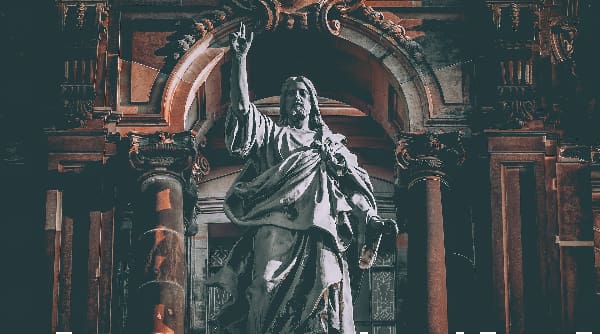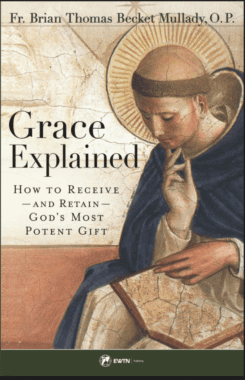We have established the principle that man is made principally for the vision of God. This requires an elevation of our human powers, that man might realize this purpose. It is essential to remember that human nature is not neutral with respect to God. By the very fact of having an intellect, the spiritual being who is man, created on the horizon of being between time and eternity, must not only have seeing God in the face as his final happiness, but must also be able to progress toward this end in order to experience wholeness and integrity.
This progress requires the Redemption of our state of fallen nature. Once Adam and Eve lost grace, they became alienated first of all from God. Since peace—our reconciliation with God by sharing in His inner life through the Holy Spirit—was absolutely necessary for human integrity, Adam and Eve therefore lost their own integrity with themselves and with the world. In contrast to their original state, which we noted earlier (see Gen. 2:25), they were now naked and ashamed (Gen. 3:7). They had lost the perfect control of their reason and bodies and emotions that came with the state of original justice, and they could no longer fully trust one another because they did not trust God.
If this were not enough, creation itself rebelled against man’s tillage because it is no longer characterized by disinterested love but by exploitation. Man who was meant to be a steward of creation has now become an exploiter. “Cursed is the ground because of you; in toil shall you eat of it all the days of your life; thorns and thistles it shall bring forth to you; and you shall eat the plants of the field. In the sweat of your face you shall eat bread” (Gen. 3:17–19). The ultimate absurdity then occurs, that a being meant for God returns to dust. Matter seems to triumph over spirit: “You are dust, and to dust you shall return” (Gen. 3:19).
The disorder and domination do not stop with the parents. The children pick it up, and Cain kills Abel. In the Letter to the Hebrews, we read of the faith of Abel: “By faith Abel offered to God a more acceptable sacrifice than Cain, through which he received approval as righteous” (Heb. 11:4). But in trying to reconnect himself with God, Abel became an occasion of jealousy for his brother, Cain. The riotous and rebellious disunity within the parents’ souls was expressed in a riotous and rebellious relationship in matrimony, and then it became expressed in a riotous and rebellious relationship of brother to brother.
But it doesn’t stop there, either. Look at the history of the Old Testament. Sin slowly enters and permeates the whole world, often in gruesome and perverse ways, until man rebelliously seeks to raise a tower, the Tower of Babel, against God Himself. That is, man seeks to supplant God through technology. In so doing, the very sign of our rationality—our speech—that should be a sign of our reconciliation and union with each other now becomes a sign of our rebelliousness and disunity. The confusion of languages represents and reinforces the confusion of hearts, all caused by the loss of union with God.
Yet God permitted this to bring forth a greater mercy, that in the Redeemer, man should be united to God in Person. The resolution will only finally occur when Jesus, after atoning for all sins on the Cross, sends the Holy Spirit back to us. Babel is reversed at Pentecost. By the sanctifying power of the Holy Spirit, the integrating gift of fellowship with God is now brought back inside human hearts to elevate us again to God’s point of view. Only when we adopt God’s point of view—only when we are reconciled to Him and call Him our friend and act as a friend would act toward Him—can we become friends with the human race again. Sure, we can pass just laws that direct our exterior conduct and maybe keep people from inciting chaos by punishment, but we can’t change them interiorly.
This is the condition in which human beings find themselves as a result of the loss of grace. But God does not leave us here. The cure addresses the sickness right at its source. Remember that there are two principal punishments for the Original Sin: the darkness of the intellect and the malice of the will. Though it’s possible for man to understand certain truths, it’s very difficult for man to connect those natural things to God as the author of nature simply by his own intelligence. Though fallen man is not totally depraved, he can’t love the world as God loves the world, and it is impossible for him to persevere in a right intention toward the things he does love for very long.
The Original Sin was committed in both the intellect and the will. Thus, God allowed the human race to wander for centuries in this darkness of mind and malice of will principally to teach them their need to rely upon Him, their need for a redeemer. If God had sent the Redeemer immediately after the Original Sin, it would have taught complacency, and so instead He showed us how tragic human life is without Him. Then, at a certain point in time, He chose little by little to begin our cure. He began it with the faith of Abel, a faith that slowly matured over the generations until man began to look to God to direct his life. As an essential part of the process, God established a community in Abraham and then based it on law when He sent Moses to instruct His people that whatever they did here on their earthly pilgrimage affected how they would live after death.
The first three Commandments are about worship of God because being reconciled to Him is the cause of human reconciliation, and because participating in divine nature is the only way that man can become truly himself. It’s not possible for a person to know the world as God knows the world and to love the world as God loves the world without also loving other human beings as God loves them. And so the last seven Commandments were meant to bring to human minds again what it meant to be a participant in divine nature and to show that the ordinary actions of life have divine repercussions.
And yet we read in 2 Corinthians 3:6 that the Old Law kills. This is because, while in itself the Old Law was good, it could not heal our intellects and our wills, and therefore it was impossible to follow in perfect faithfulness. The law and the ceremonies expanded the Israelites’ knowledge of what was right and wrong (and thus their culpability), but it did not communicate grace, nor the presence of the Holy Spirit, to see it through. This doesn’t mean the law was valueless, just that it was incomplete. For example, while circumcision could not justify a person, joined with faith in the future Messiah it demonstrated our weakness and the necessity for sacrifice and redemption.
And so, in the Jews’ inability to follow what the law commanded, they realized that there was something lacking within themselves. What would be revealed was that this was the presence of the Holy Spirit Himself. This presence could only be restored by a divine figure who would take flesh and would satisfy for the original sin by taking upon Himself its punishment. The faith of Israel, therefore, was a faith that sought to recover this original spirit of being a partaker in the divine nature.
This is shown most beautifully in the elderly Simeon and Anna, who find the One who completes that faith in the Temple, the One who is going to bring back to the world the light and grace they’ve been waiting for all their lives. As Simeon proclaimed:
Lord, now lettest thou thy servant depart in peace, according to thy word; for mine eyes have seen thy salvation which thou hast prepared in the presence of all peoples, a light for revelation to the Gentiles, and for glory to thy people Israel. (Luke 2:29–32)
+
This article is adapted from a chapter in Grace Explained by Fr. Brian Thomas Becket Mullady, O.P. which is available from Sophia Institute Press.
Art for this post on Grace Explained: Cover and featured image used with permission.





